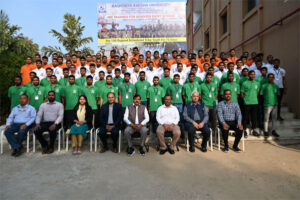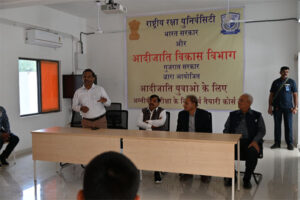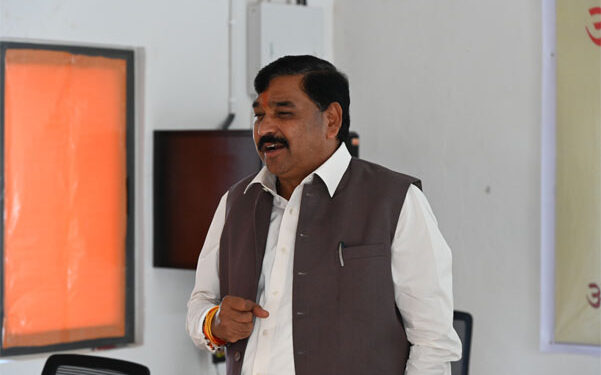- Gujarat Tribal Development Minister Dr. Kuberbhai Dindor, and Dr Murli Krishna, Principal Secretary of the Tribal Development Department, recently visited the Raskah Shakti School Campus in Pethapur to observe the ongoing Agniveer examination preparation training programme
- Dindor lauded the commitment of the aspiring individuals to join the Agniveer cadre in service to the nation
- The training aims to equip the aspirants with the necessary skills and knowledge required to excel in the competitive examinations conducted by the Indian Armed Forces
NE EDUCATION BUREAU
GANDHINAGAR, DEC 30
In alignment with Prime Minister Narendra Modi’s vision of creating job opportunities for youth, especially tribals from Gujarat, Gandhinagar-based Rashtriya Raksha University (RRU), an institution specialising in national security and policing, announced on Saturday that it has joinded hands with Gujarat Tribal Development Department to impart training to 300 Agniveer aspirants from the state tribal belt.

Recently, the central government had announced the Agnipath scheme under which aspirants aged between 17-and-a-half years and 23 years will be recruited on a four-year contractual basis across the three services- the Indian Army, Indian Navy or the Indian Air Force (IAF).

Gujarat Tribal Development & Primary, Secondary & Adult Education Minister Dr Kuberbhai Dindor, and Dr Murli Krishna, Principal Secretary of the Tribal Development Department, recently visited the Raskah Shakti School Campus in Pethapur to observe the ongoing Agniveer examination preparation training programme. The training programme is being conducted at the school campus for Agniveer aspirants, with approximately 150 participants currently enrolled.
During the visit, Dr. Kuber Dindor, and Dr. Murli Krishna, conducted an inspection of the training activities. Both expressed satisfaction with the University’s endeavours in equipping Agniveer aspirants with essential skills and knowledge needed to excel in various competitive examinations for the Indian Army.
Dr. Dindor lauded the commitment of the aspiring individuals to join the Agniveer cadre in service to the nation. He commended the collaboration between Rastriya Raksha University and the Department of Tribal Development, emphasizing their dedication to providing such training opportunities and fostering growth. Dr. Dindor not only praised the University’s commitment to preparing the next generation of Agniveer cadre but also sanctioned preparation training for an additional 300 tribal youths, assuring them of his support. He advocated for more grassroots-level activities dedicated to the welfare of tribal youths. Dr. Dindor highlighted the rich history of tribals, making the visit a morale booster for both trainees and faculty involved in the program.
Dr. Murli Krishna, Principal Secretary, shared insights into government schemes related to tribal development, encouraging the youths to seize opportunities. He played the fundamental role for the Agniveer examination preparation training programme implemented jointly with the RRU.
The visit by Dr. Kuberbhai Dindor and Dr. Murli Krishna highlights the importance of the Agniveer examination preparation training programme for the development and empowerment of the tribal communities. The training aims to equip the aspirants with the necessary skills and knowledge required to excel in the competitive examinations conducted by the Indian Armed Forces.
The participants receive guidance from experienced trainers who are retired senior army officers well experienced in conducting such examinations, helping them understand the requirements and preparation for the Agniveer selection process. Additionally, the training program also focuses on the overall personality development of the aspirants to ensure their success in the competitive examination.
The Agniveer examination preparation training program stands as a pivotal initiative, offering valuable opportunities for tribal youths to serve in the Indian Army. This endeavour not only fulfils their dreams of military service but also contributes significantly to the overall development of the region.










